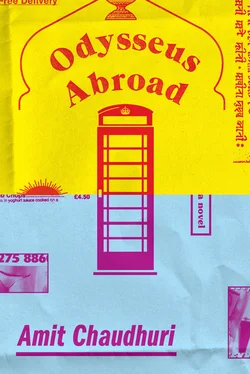Amit Chaudhuri
Odysseus Abroad
In Baba’s memory, with gratitude and love
And for Rinka, who wanted this book
…I have tried to be as faithful to my recollections as I possibly could be. No doubt the unreliability and capriciousness of memory have led me to run together certain incidents and occasions, and to confuse some of the people involved in them. But if I have done these things, they have been done inadvertently. At no point have I deliberately departed from what I remember, or believe I remember.
At the same time…I wanted not only to tell the truth, as far as I knew it, about experiences I had been through or people with whom I had been involved, but also to produce tales, real stories, narratives which would provoke the reader’s curiosity and satisfy it; which would appear to begin naturally, develop in a surprising and persuasive manner, and come to an end no sooner or later than they should.
— DAN JACOBSON, Time and Time Again
As for these changes in me, they are the work of the warrior goddess Athene, who can do anything, and makes me look as she wishes, at one moment like a beggar and at the next like a young man finely dressed. It is easy for the gods in heaven to make or mar a man’s appearance.
— HOMER, The Odyssey
I believe our tradition is all of Western culture, and I also believe we have a right to this tradition, greater than that which the inhabitants of one or the other Western nation might have.
— JORGE LUIS BORGES, “The Argentine Writer and Tradition”
He got up at around nine o’clock with the usual feeling of dread. He threw off the duvet. Still unused to being vertical, he pounded the pillow and the sheet to ensure he’d dislodged strands of hair as well as the micro-organisms that subsisted on such surfaces but were invisible to the naked eye. He straightened the duvet, tugging at it till it was symmetrical on each side. He smoothed the sheet, patting it but skimming the starchy bit — a shiny patch of dried semen, already quite old — on the right flank of where he’d lain.
The anger inside him hadn’t gone — from the aftermath of the concert. He’d watched it six days ago on TV: Africa, London, and Philadelphia conjoined by satellite. He switched it off after three quarters of an hour. By the time the Boomtown Rats came on, and the sea of dancing people in Wembley Stadium was being intercut with Ethiopian children with innocent eyes and bulbous heads, a phrase had arisen in his consciousness: “Dance of death.” Didn’t the exulting crowds in Wembley and in Philadelphia see their heroes’ and their own complicity in the famine? But surely this line of thought was absurd, maybe malicious, and to interpret in such terms an event of messianic goodwill, meant to bring joy and food to Ethiopia, nothing but perverse? So what if it brings a bit of joy to Londoners as well? Is that what you’re resenting? He’d discussed it with Mark while having lunch in the Students Union Building; and Mark, in the incredibly tolerant way of one who’s brushed aside death (he was a cancer survivor; his lower left leg was amputated), and who saw his friend’s madness for what it was, said with self-deprecating reasonableness: “I think any kind of effort that brings relief to Africa is all right.” “Can one make an aesthetic objection, though, however awful that might sound?” Ananda had insisted. “Can an aesthetic objection go beyond what might seem morally right? That all those people cheering and dancing in Wembley Stadium, all of them thinking that by dancing to the music they were doing those starving children a good turn — that it made it quite wrong and macabre somehow, especially when you saw the faces of the children?” Mark smiled a smile of understanding — and of one who knew death’s proximity. As for Ananda: his own position on this matter underlined to him his isolation from the world — from London, for that matter.
—
That feeling had come to him at other times, when he’d seen the necessity for certain actions and yet couldn’t participate in them — including the great march that took place a couple of years ago soon after he’d arrived here as a student. He remembered his first awkward hour in the college — joining the other first years for the freshers’ get-together in the Common Room on the second floor of Foster Court, ascending the stairs under a painting by Whistler, and ending up informing a bespectacled girl with a Princess Di haircut that the Sanskrit prem meant both carnal desire and love, that there was no separation between the two in “Indian culture.” The girl had smiled distantly. Only a week or two after his arrival, the news of the imminent cruise missiles had gathered force, leading finally to the march. He didn’t want to die and he didn’t want the world to blow up (as it seemed it any day would), but he couldn’t spend too much time thinking of the shadow of death hanging over mankind. Yet he didn’t quite admit this to himself. It was his uncle, who’d come to see him the next day in Warren Street, who’d said, while watching the Hyde Park — bound procession on TV with Monsignor Kent in the foreground (a touch of revolutionary glamour it gave to this man, the word “Monsignor”):
“They’re not getting to the root cause. They’re concerned about the symptom.”
This was uttered in the droopy-eyed, amused way in which he spoke aphorisms containing a blindingly obvious truth ignored by everybody.
“Symptom?” said Ananda, challenging his uncle, but part of him chiming in.
“The nuclear bomb’s only a symptom,” repeated his uncle, almost contemptuous. “Getting rid of it won’t solve anything. Arrey baba, they have to look at the root cause.”
—
He pottered about for three or four minutes, making wasted journeys in the room, before parting the curtains and lifting the window a crack. In crumpled white kurta and pyjamas, he looked out on the street and on Tandoor Mahal opposite, unconcerned about being noticed by passers-by below. It was striking how, with the window even marginally open — heavy wooden windows he had to heave up or claw down, and which he was unused to (they made him fear for his fingers) — sounds swam into the studio flat, making him feel paradoxically at home. His mind was elsewhere. He was aware that the house itself was very quiet. The only time there was a sound was when he walked about, and a floorboard groaned at the footfall.
Upstairs, they’d sleep till midday or later. He knew when they were awake because of the sporadic bangs and thuds that announced movement. It was as if the person who first woke up didn’t just get on their feet, but stamped on the floor. The noise they made wasn’t intentional — it was incidental. It wasn’t directed against others because it bore no awareness of others. It was pure physical expression, made by those whose heads didn’t carry too many thoughts — at least, not when they woke and became mobile again.
—
He hadn’t slept well. This was the norm; partly, it was the recurrent hyperacidity, which had him prop up two pillows against the wall — that made it difficult to sleep too — and, cursing, reach in the dark for the slim packs of Double Action Rennie he kept at his bedside. The taste of the tablets — with associations of chalk powder and spearmint — stayed with him slightly longer than their palliative effects.
But mainly it was the neighbours. They hardly slept till 3 or 4 a.m. There were three people upstairs, but also, often, a fourth. Vivek Patel, who wore pleated trousers and was lavish with aftershave; he wore accessories too — chains around the wrist, fancy belts etcetera.
Читать дальше











